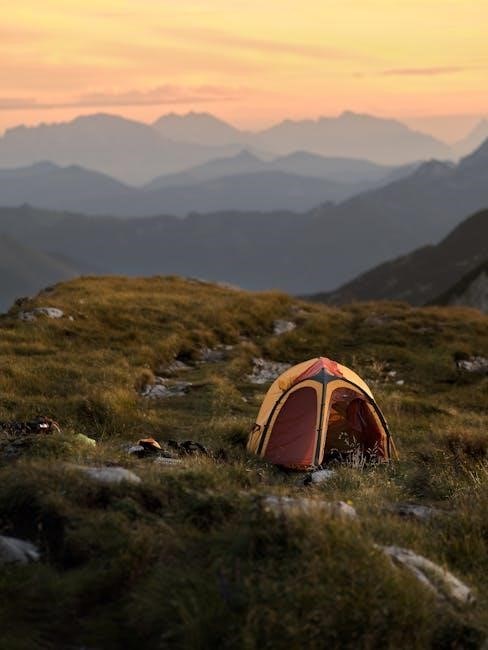Earning the Camping Merit Badge is a fantastic way for Scouts to develop essential outdoor skills and a deeper appreciation for nature. It focuses on camping techniques, meal preparation, and safety, fostering self-reliance and teamwork.
1.1 Overview of the Camping Merit Badge
The Camping Merit Badge is a comprehensive program designed to equip Scouts with essential outdoor skills, fostering a deep connection with nature and promoting teamwork. To earn this badge, Scouts must complete a series of requirements that include camping experiences, meal preparation, and safety protocols. The program emphasizes hands-on learning, encouraging Scouts to develop proficiency in pitching tents, using camping gear, and navigating with maps and compasses. A key component is the requirement to camp a total of at least 20 nights at designated Scouting events, with the option to apply one long-term camping experience of up to six consecutive nights. Additionally, Scouts must plan and prepare meals, demonstrating their ability to cook for their patrol. The badge also focuses on Leave No Trace principles and outdoor ethics, ensuring Scouts understand how to minimize their environmental impact. By completing these tasks, Scouts not only gain practical skills but also develop a sense of responsibility and respect for the outdoors. The Camping Merit Badge workbook provides a structured guide to help Scouts track their progress and meet all requirements effectively.

1.2 Importance of Earning the Camping Merit Badge
Earning the Camping Merit Badge is a significant achievement for Scouts, as it equips them with vital outdoor skills that foster independence, teamwork, and environmental stewardship. This badge is particularly important because it teaches Scouts how to navigate, camp safely, and prepare meals in the wilderness, preparing them for future adventures. It also emphasizes the importance of Leave No Trace principles, ensuring Scouts understand how to preserve the natural environment. By completing the requirements, Scouts build confidence and develop a deeper appreciation for nature. Additionally, the Camping Merit Badge is one of the Eagle Scout required badges, making it a crucial step toward advancing in the Scouting program. The skills learned, such as emergency preparedness and outdoor ethics, are invaluable for a lifetime of outdoor exploration. Overall, this badge is a cornerstone of Scouting, promoting personal growth and a lasting connection to the great outdoors.

Key Requirements for the Camping Merit Badge
The Camping Merit Badge requires Scouts to demonstrate proficiency in camping skills, including planning, safety, and outdoor ethics. Scouts must camp for at least 20 nights, prepare meals, and apply Leave No Trace principles.

2.1 Understanding the Camping Merit Badge Requirements
To earn the Camping Merit Badge, Scouts must demonstrate a strong understanding of camping skills and outdoor ethics. The requirements are designed to ensure Scouts gain hands-on experience and knowledge in areas such as camping techniques, meal preparation, and safety. Scouts must camp a total of at least 20 nights at designated Scouting activities or events, with one long-term camping experience of up to six consecutive nights applicable toward this requirement. Additionally, Scouts must sleep under the sky or in a tent they have pitched. Meal planning and preparation are also essential, as Scouts must cook at least one breakfast, lunch, and dinner for their patrol during a camping trip. Trail meals requiring a lightweight stove are also required. Safety and emergency preparedness are emphasized, with Scouts needing to explain potential hazards and how to mitigate them. Finally, Scouts must understand and apply the Leave No Trace principles and the Outdoor Code to promote environmental responsibility. By fulfilling these requirements, Scouts develop a comprehensive understanding of camping and outdoor skills.
2.2 Camping Experience Requirements
The Camping Merit Badge requires Scouts to accumulate a significant amount of camping experience to demonstrate their proficiency in the outdoors. A key requirement is camping a total of at least 20 nights at designated Scouting activities or events. These nights can include a combination of short and long-term camps, with one long-term experience of up to six consecutive nights applicable toward this requirement. Scouts must sleep under the stars or in a tent they have pitched themselves, which helps build their shelter-building skills and connection with nature. This extensive camping experience ensures Scouts gain practical knowledge of camping techniques, teamwork, and self-reliance. By spending numerous nights in various camping settings, Scouts learn to adapt to different environments and challenges, fostering a deeper appreciation for the outdoors and preparing them for more advanced adventures. This hands-on approach is central to the merit badge program, emphasizing real-world application of skills and principles.
2.3 Meal Planning and Preparation
Meal planning and preparation are essential skills for Scouts working on the Camping Merit Badge. Scouts must plan and prepare meals for their patrol, demonstrating their ability to manage food safely and efficiently in an outdoor setting. A key requirement is cooking at least one breakfast, one lunch, and one dinner for their patrol using meals planned specifically for the outing. Additionally, one of these meals must be a trail meal, which requires the use of a lightweight stove. This teaches Scouts how to prepare nutritious and satisfying meals in the wilderness, even with limited resources. Scouts also learn about food safety, proper storage, and waste disposal to ensure a clean and hygienic camping environment. By mastering these skills, Scouts become more self-sufficient and capable of leading their peers in meal preparation during future camping trips. This practical experience not only enhances their outdoor abilities but also fosters teamwork and problem-solving skills.
2.4 Safety and Emergency Preparedness
Safety and emergency preparedness are critical components of the Camping Merit Badge. Scouts must demonstrate an understanding of the potential hazards they may encounter while camping, such as inclement weather, wildlife, and accidents. They are required to explain how to anticipate, prevent, mitigate, and respond to these hazards. This includes creating a duty roster for their patrol, which outlines responsibilities during an overnight campout, ensuring everyone is prepared for emergencies. Scouts must also discuss how Scout spirit, the Scout Oath, and Law apply to camping safety and outdoor ethics. Additionally, Scouts learn about first aid and emergency response, including how to handle situations like altitude sickness, which is not covered in other merit badges. Practical training in these areas ensures Scouts are well-equipped to handle unexpected situations, making camping experiences safer and more enjoyable. This emphasis on safety fosters confidence and responsibility, essential for any camper.
2.5 Leave No Trace Principles and Outdoor Ethics
Understanding and implementing the Leave No Trace principles is a cornerstone of the Camping Merit Badge. Scouts learn to minimize their impact on the environment by following these seven key principles: plan ahead and prepare, travel and camp on durable surfaces, dispose of waste properly, leave what they find, minimize campfire impacts, respect wildlife, and be considerate of other visitors. Additionally, Scouts must explain the Outdoor Code, which emphasizes respecting the environment and other people. They are also required to create a personal and group plan for upholding these principles during their camping outings. This focus on environmental stewardship and ethical behavior ensures that Scouts become responsible outdoor enthusiasts. By integrating these principles into their camping experiences, Scouts not only preserve nature but also set an example for others to follow. This section of the merit badge fosters a deep appreciation for nature and promotes sustainable camping practices.
Earning the Camping Merit Badge is a rewarding experience that equips Scouts with essential outdoor skills, fostering self-reliance, teamwork, and environmental stewardship. It prepares them for lifelong adventures while promoting a deep appreciation for nature and conservation.
3.1 Final Tips for Completing the Camping Merit Badge
To successfully earn the Camping Merit Badge, Scouts should stay organized and proactive. Begin by carefully reviewing the requirements and creating a personal plan to track progress. Utilize the Camping Merit Badge Workbook to organize tasks and reflections. Practice camping skills regularly, such as tent pitching, meal preparation, and navigation, to build confidence and proficiency. Engage with experienced counselors and fellow Scouts to gain insights and tips. Remember to emphasize the Leave No Trace principles in all outings to promote environmental ethics. Additionally, ensure all safety protocols are followed, especially during meals and treks. By staying committed and prepared, Scouts can efficiently complete the badge and develop lasting outdoor skills.





